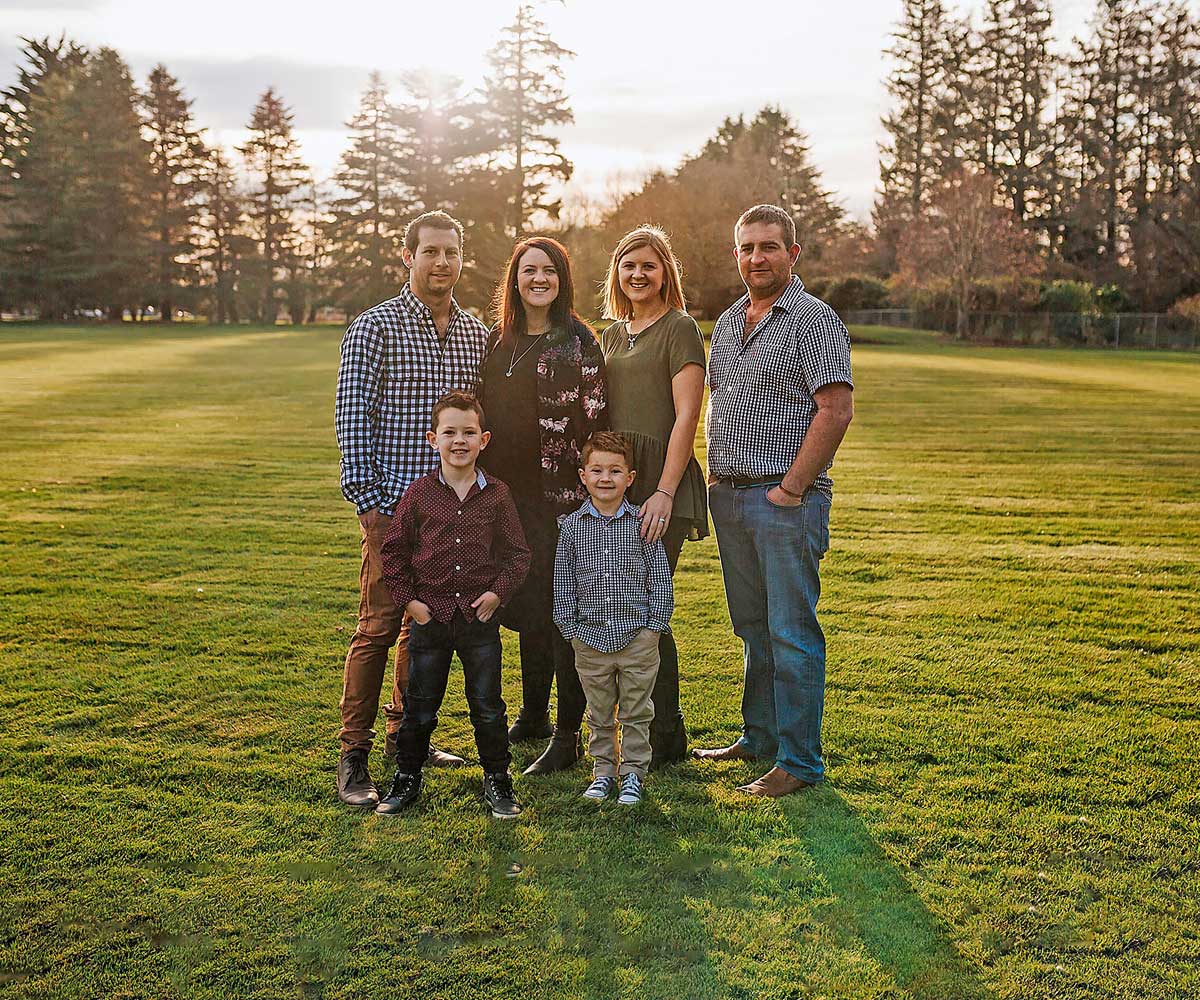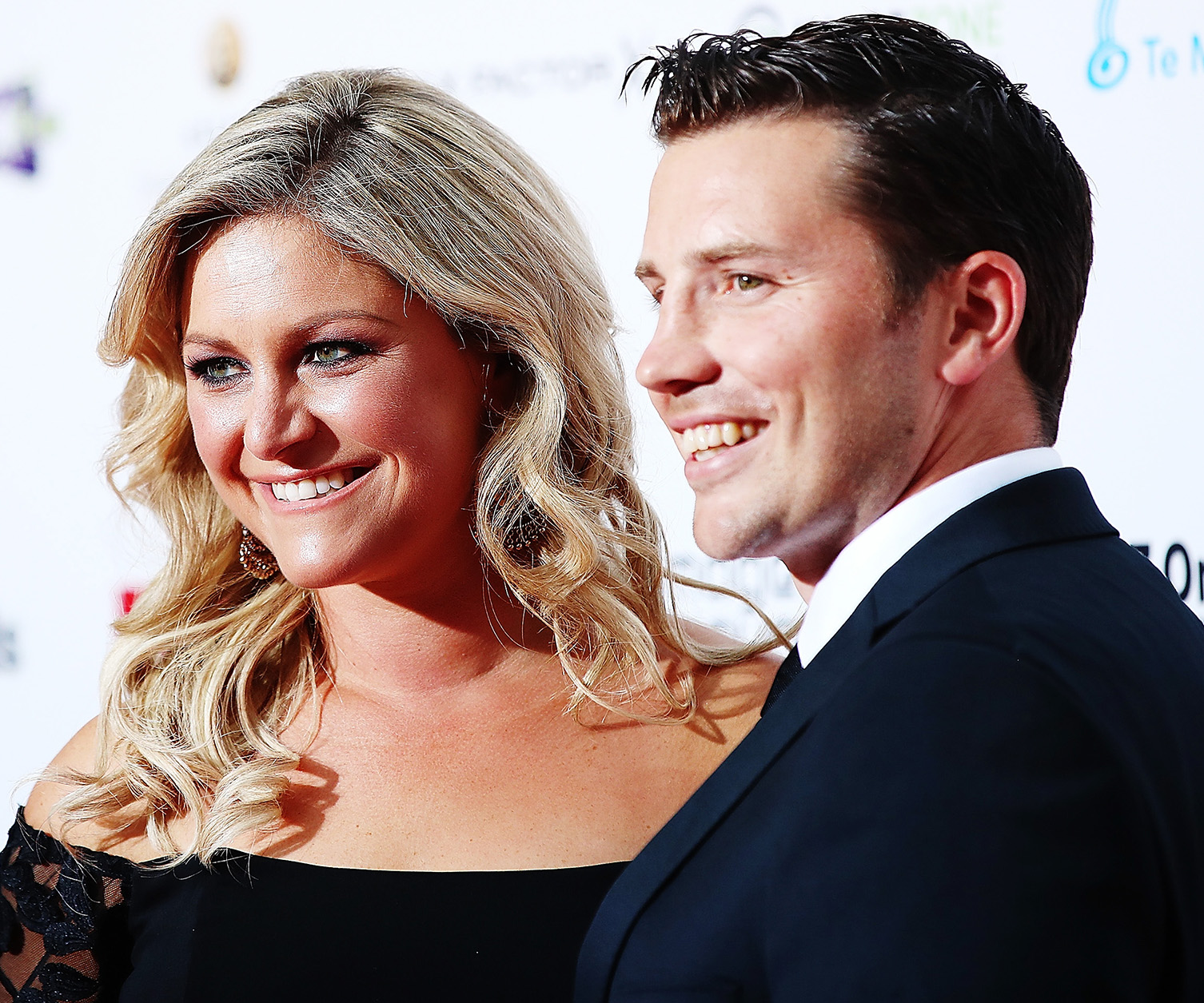In December 2017, Hannah Leslie became pregnant with her sister’s child, one of an increasing number of babies being born by surrogate. Today, Harry George is a bouncing nine-month-old. Courtney George says, “It’s amazing that my sister gave up her body for nine months so I could have a baby.”
Each year, about 20 to 25 surrogacy pregnancies are approved by the Ethics Committee on Assisted Reproductive Technology (ECART). In New Zealand, surrogacies are an altruistic arrangement, which means the surrogate is unable to take any money from the intending parents. In what is a much-criticised law, the surrogate mother and her partner are the legal parents until the intending parents adopt the child.
The close bond between sisters
Courtney and Hannah were born 16 months apart and have always been close. Now 31 and 32 respectively, they were each other’s bridesmaids and live around the corner from one another in Ashburton, Canterbury.
At 25, Courtney was diagnosed with cervical cancer. After having her cervix removed, doctors told her she could still have children, though she might need help conceiving and it would be a high-risk pregnancy, with a chance of early delivery. Learning this, Hannah told her sister, “If you ever struggle to have a baby, I’ll be your surrogate.”
A year later, Courtney got married to husband Hamish, and they started trying to have a family. When she failed to get pregnant, the couple resorted to IVF, undergoing multiple cycles of government-funded egg harvesting. Courtney had three unsuccessful embryo transfers. Left with four frozen embryos, Fertility Associates suggested she might consider surrogacy.
“They told me those embryos were like gold,” she says.
By this time, Hannah had two sons, Hudson, now seven, and Declan, now five, and she and husband Dave had decided their family was complete.

Starting the journey of surrogacy
Courtney fights back tears remembering the moment the sisters talked about Hannah carrying her baby.
“I told Hannah the doctors had suggested we go down the surrogacy route. We were both crying. I asked if she would still be keen, and Hannah said of course, but I told her to go away and talk to her husband.”
Hannah didn’t think twice. “I always knew Courtney would be a great mum and I wanted to help her any way I could.”
Both husbands were supportive. Hannah says, “Dave was on board and I wanted the boys to have a cousin too.”
However, the couples had to get approval from the ethics committee, which took about three months and cost $2700 in application fees. They also had to go through hours of counselling imagining different scenarios, such as what would happen if pregnancy scans showed an abnormality or if Hannah bonded with the baby when it was born.
In December 2017, Hannah went into the clinic for the first embryo transfer. Only one embryo is planted in a surrogate, as it’s considered too much of a risk for her to carry twins. A few days after Christmas, the sisters got the exciting news that Hannah was pregnant.
“We were really lucky that Hannah got pregnant so quickly as that is really unusual,” says Courtney. “Hannah videoed the moment when she told her boys, which was really special. They understood right from the start that their mother was carrying their cousin.”
Throughout, Courtney had followed news about Toni Street’s surrogacy, as their surrogates were both pregnant at the same time.
“I sent her a message right away saying congratulations.”
Keeping the baby in the family
“It felt a bit strange that I couldn’t feel the baby moving,” says Courtney, who attended all the appointments. “But Hannah sent me regular updates, and I could feel him kicking when I touched her stomach.”
Says Hannah: “It’s hard to explain but I just felt that it was my niece or nephew.”
While she wasn’t working at the time, the hardest thing was being pregnant while looking after two young boys.
“I definitely found my third pregnancy the hardest, possibly because I was older.”
Hannah told everyone who asked that she was carrying her niece or nephew.
“Everyone was excited for us because our friends and acquaintances knew what Courtney had been through.”
The sisters agreed that the baby would be born by elective caesarean, as Hudson was born by caesarean and they decided it might be too risky for Hannah to give birth. As soon as Harry was born on August 31, the doctors handed him straight to Courtney.
“Courtney and Hamish had the first cuddle. I didn’t want to rush it,” says Hannah, who adds, “I never felt like it was my baby.”
Today, Hannah delights in Harry’s first moments just like any aunt.
“We look at the boys’ Plunket books and compare notes. It was only nine months of my life but the sacrifice was worth it. My boys just love their cousin too.”
Courtney and Hamish adopted Harry in January, a process that Hannah says “is ridiculous. Harry is their DNA and all the costs and the hassle of going through that is one of the hardest things.”

The rising trend of surrogacy
Dr Sarah Wakeman, medical director of Fertility Associates in Christchurch, where the sisters went through the surrogacy progress, explains why a woman or couples choose surrogacy: there is a medical reason, where a woman is born without a uterus or has had it removed due to cancer; a severe illness or medical condition, as in Toni Street’s case, means a pregnancy would not be safe; or women have struggled to fall pregnant via IVF so find a surrogate.
Dr Wakeman says a growing number of gay male couples and single women are opting for surrogacy. Surrogates are typically either friends or family members, or are known to one another. Some parties are initially strangers, although the parties are expected to form a relationship over six months before they apply to ECART.
“It’s a huge deal to be pregnant with someone’s baby,” says Dr Wakeman. “We’re also seeing some surrogates who haven’t been pregnant before being approved as surrogates.”
A member of the advisory group that assists ECART, Dr Wakeman says, “The legislation is in place to protect everyone – the people who want to become parents, the surrogate, and the child.”
Intending parents pay about $5500 for a surrogacy pregnancy on top of IVF, which costs up to $14,000. (Courtney’s costs were government-funded because of her cancer.) Embryos are formed via IVF and frozen until the ethics committee gives approval. Once approved, one embryo is transferred, but Dr Wakeman says it can take several attempts before a surrogate becomes pregnant.
Dr Wakeman has seen her share of difficult surrogacies – complications, miscarriages, a birth that goes wrong, and the two parties getting into strife.
“Our counsellors remain involved throughout the process. It’s not uncommon to have tensions around the time when the baby is born but I’ve never known a baby not to be handed over.”
The adoption also has to be approved by an Oranga Tamariki social worker, although, to date, the organisation hasn’t refused one. Although some couples go overseas for a surrogate, that can be expensive – $100,000-plus in the US – and fraught with challenges getting the baby into New Zealand. “You have to make a case to the Minister of Immigration, and there have been cases of babies being stuck overseas.”
Legal battles for a baby that is biologically theirs
University of Waikato ethics lecturer Dr Ruth Walker says to approach overseas surrogacy with caution, especially as countries like India and Thailand have cracked down on commercial surrogacy.
As a co-author of the book, Towards a Professional Model of Surrogate Motherhood, Dr Walker and ethicist Liezl van Zyl researched surrogacy in New Zealand, conducting in-depth interviews with parents and surrogates about their concerns. One main concern is that surrogacy arrangements aren’t binding, so the surrogate could refuse to relinquish the baby.
“There are also surrogates who fear that the parents might change their minds and not take the baby.”
Dr Walker says the ethics committee is fair and reasonable. Of 119 applications from 2014 to 2018, only two were declined because of risks to the surrogate’s health.

Critical of the current law around adoption, Dr Walker says it adds to the cost of an already expensive system – medical, counselling and legal bills on top of IVF. “The fact that the parents have to go through the same hoops as a stranger adoption cannot be justified.”
Arguing we are long overdue for a law overhaul, she thinks surrogate births will rise over time, if couples can find the surrogates. She would prefer a system like Canada’s, where intending parents are allowed a more liberal interpretation of paying ‘costs’. If a surrogate takes time off work to carry a child, for example, the parents could pay her loss of income.
She adds that publicity around Toni Street’s surrogate baby, Lachlan, brings the procedure into the open. “It helps to have a nice, normal surrogacy story rather than the alarmist ones. The vast majority of surrogacies work out for everyone.”
It’s a point made by Courtney, who adds, “I do think that Toni’s case helps bring surrogacy out into the open and show that things can go really well for those involved.”
Meanwhile, Courtney and Hamish are hopeful that one of their three frozen embryos may one day be a brother or sister for Harry. Having already had three pregnancies, Hannah wouldn’t be the surrogate a second time around.
“Finding a surrogate would be the hardest challenge,” Courtney says.


